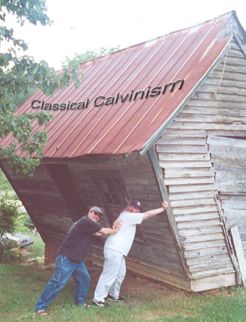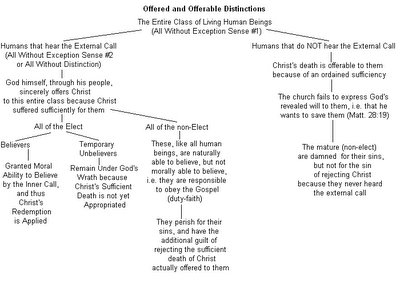The following chart was made to help some see a distinction between a classical Calvinistic view and the later strict view of the Protestant Scholastics or High Calvinists. It's purpose is to deal with inhouse debates within Calvinistic circles, not to address non-Calvinistic theology. Since I am a dualist, I maintain that Christ died for all, but especially for the elect. I don't believe that Christ died with an equal intent to save all men (contra Arminianism and free will theology), nor do I believe that Christ intended died to save the elect alone (contra High Calvinism and Hyper-Calvinism). My views are grounded in the classical conception of the distinction between God's secret and revealed will. I do not seek to negate the secret by the revealed will (what Arminianism entails), nor do I collapse God's revealed will into the secret (what Higher Calvinism entails). I believe the secret or decretal will of God represents a distinct motive from the revealed or preceptive will of God, and that this volitional or motivational complexity can subsist in a rational, immutable and eternal Trinity as Dabney shows. God loves all men, but he especially loves the elect. Christ died for all men, but he especially dies for his elect. God wants to save all men, but he especially wants to save his elect. This is Calvin's position, and I believe the biblical position. These truths have been obscured by later High Calvinists, so some of us are seeking to restore the older model that has been eclipsed. My friends and I are seeking to restore and uphold the house of classical Calvinism.

This is no easy task when so called "Calvinists" themselves resist it. May the following chart contribute to the restoration of the early view of the Reformers, and to the glory of God:

A few notes on the chart above:
1) Sometimes the advocates of the free offer are misrepresented as if they are saying the gospel is actually offered to all without exception, i.e. to all living human beings on the planet (Sense #1). That's actually a straw man. We would say that the gospel is offerable to all living human beings because of the real sufficiency in Christ's death, and also that God wants or intends it to be offered to them, but not that it actually is offered. We wish to use the term offerable in the sense that Christ's death is able to be applied to them, and that God, in his revealed will as expressed in Matt. 28, wishes to do so. He does not delight in the death of the wicked.
2) When free offer Calvinists use the phrase "all without exception" to argue that God offers Christ to all human beings, they have the second sense in view, i.e. all living human beings who hear the external gospel call. In the second sense used in the chart, all without exception includes all without distiction. There are many kinds and classes of people within the group of those who hear the external call. Some high Calvinists use the expression "all without distinction" to really mean "some of all without distinction." They want to jump from the idea of "all without distinction" or "all kinds" to "the elect from all kinds." This logical leap is unsustainable biblically. When Paul uses "all" in a context that refers to types or kinds, then "all without distinction" includes "all without exception" in the second sense (Sense #2).
3) Some High Calvinists wish to speak only of our responsibility to preach or offer the gospel to all because we are ignorant as to the identity of the elect. This is not sufficient. The bible teaches that God himself is offering Christ to all without exception (Sense #2) through his people, and he knows the identity of his elect ones. The crucial point is that God himself sincerely offers Christ to those he knows to be non-elect. This is what the strict Calvininsts cannot stomach. It's indicative of their decretal illness or mental lopsidedness. Their fevered brains cannot tolerate such an idea. Nevertheless, it is what the scriptures teach, and what Calvin himself echoed.
4) God is able to do this because he has expiated the sins of the world in the death of his Son. He comes to the entire world seeking complete reconciliation through his Son. He sent his Son to satisfy all of the claims of the law against all sinners. Christ suffered a morally equivalent death that every single human sinner deserves. For this reason, his death is said to be sufficient for all. If he did not undertake the curse that was due every sinner, it could not be said that his death is sufficient for those that were not legally represented. A limited imputation view (Christ suffered for the elect alone) is incompatible with the classical view on unlimited sufficiency. Some high Calvininsts honor the "sufficient for all" formula with their lips, but their hearts are far from it. They can only speak of a mere sufficiency, but not an ordained sufficiency. In effect, Christ's death is really only sufficient for the elect, in their view. For more on this distinction, see Davenant's Sufficiency Distinctions.
5) All human beings are naturally or constitutionally able to believe, but they lack moral ability to do so. They have a will that makes choices (natural ability), but their won't power (perverted affections) or bondage to sin makes them unable to believe (moral inability). Being pervasively depraved (in mind, will and emotions), they don't want to believe, nevertheless they are responsible before God. Only those who hear the external call are responsible to believe the gospel command, but all men are responsible to God's moral law (Incidently, I'm not saying that obeying gospel commands is the same as obedience to the moral law). If humans do not respond in faith or trust in Christ through the gospel, their guilt is compounded and/or aggravated because of God's great benevolence and sacrifice in sending his Son to die for their salvation. Also, since all the other gifts of common grace are given with a view to their repenting or salvation (see Rom. 2:4), the wrath of God builds up against them.
6) All men are redeemed or objectively reconciled in Christ since he's the last Adam who died in the place of all men, but not all men are in him by faith. The legal barriers that stand in the way of God freely forgiving any man have been removed. No man must of necessity be damned, for there is a real remedy available for him in Christ's death. It is applicable to all men, for Christ died a morally equivalent death that all men deserve, and only a Godman could do this. His redemption is applied when we trust in him, for then we are really united to him. Prior to that, we all stand under God's wrath, even the elect who do not yet believe. Though Christ dies for a man, it does not follow that he is thereby liberated by that fact alone. It is the entire work of the Trinity that secures our salvation, and not the death of the Son by itself. The Holy Spirit must apply the work of the Son through faith, and he will do this in accord with the special decree of the Father. The promise is conditional, not absolute. Men must believe in order to be united to Christ and receive his eternally saving benefits. Only the elect are granted moral ability to believe, and thus they are especially redeemed (not that others can't be spoken of as redeemed in another sense). There is a limitation or definite number of people that God has determined to save. These are his elect ones. This special decree is made manifest in the application of the benefits of Christ's death to the elect alone through the instrumentality of faith, and not apart from that condition. Thus, there is a limitation in the decree and application, not that there is a limitation in curse bearing in Christ's death. He takes the curse due every man when he hangs upon the tree, but no man eternally benefits until they look with the eyes of faith to the remedy.
7) The aggravated guilt on the part of the non-elect, who heard the external gospel call but rejected it, underscores the fact of the real sufficiency available to them in Christ's satisfaction. The sufficient food of Christ's flesh is set before them in the proclamation of the gospel feast, but they refuse to eat and to taste that the Lord is good for them, thus they deserve a severer punishment, as the scriptures say. This aggravated guilt could not be the case if the Lord's death was not really sufficient for them, which is what is entailed by a limited imputation view of the Owenists. A rational person would not be aggravated by those who reject what is not applicable to them. The applicability and real availability of the satisfaction is what triggers God's severity against gospel rejectors. Their damnation is surely just.
A printable version of this post can be found here: Offered and Offerable

No comments:
Post a Comment